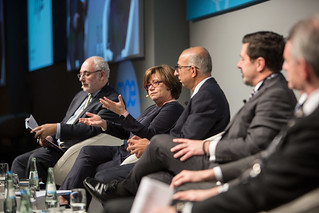I saw an interesting comment about the recent Google I/O conference, referring to the opening up of the European payments marketplace under PSD2. It came in a discussion about Google wallet:
For now, the service is linked to a user’s credit card, but not for long (at least for European users), Daniel Döderlein, CEO for payments systems provider Auka, told Bank Innovation. “Once Google’s able to go to direct to account they will cut out the cards companies and to some extent, the bank,”
From Would You Like to Set Google As Your Default Financial Institution? | Bank Innovation
This resonated with a story that I heard last year and mentioned to a few of our clients in seminars and workshops. A friend of mine was on a study tour of the US during which he visited a number of different technology companies as well as a number of different technology users in a group of related industries. He told me that the whole time he was in the US, the only people who had asked him about PSD2 came from Facebook and Google. Not from banks, not from retailers, not from payment processors and not from card issuers. Yet, as I think comes over in our recent webinar on threats and opportunities, PSD2 is a fundamental driver for all of their strategies for the foreseeable future.
When my friend came back from California with his tale of PSD2 indifference, I remember thinking at the time that it might be an indication that not all of the participants in the payment marketplace had fully evolved their open banking strategies. Hence I explained to him that as PSD2 was going to completely change the way in which consumer data is managed by banks, it was natural that banks had no strategy for dealing with it whereas people who sell consumer data for a living (e.g., Facebook and Google) would undoubtedly have already created and explored a number of different scenarios and set a strategy to exploit the changes.
Is that rather dramatic Google I/O comment justified though? Is it right that once the banks are required to open up their APIs and are forced to allow third parties to obtain account information, instruct payments and obtain confirmation of available funds, will those third parties cut out the “card companies”? In other words, is open access bad news for, to choose the obvious examples, Visa and MasterCard? Well, that depends. I remember answering this question a couple of years ago at a conference by saying that if the people that Consult Hyperion were working for at Visa and MasterCard were stupid, then it was a threat. But since the people that we were working for at Visa and MasterCard were not at all stupid, and could read the newspapers just as well as we could, I thought that on balance the new infrastructure would present an opportunity. At the time, of course, I couldn’t have foreseen that MasterCard would step up to the plate and pay $1 billion for VocaLink so quickly, thus ratifying my conclusion!
"Somehow this takeover didn’t make the news headlines, but mark my words it was one of the most significant events in the evolution of the UK payments industry since Reg Varney got a tenner out of that first ATM in Enfield half a century ago. It’s a significant milestone on the road to #cardmaggedon, and it’s not only me who thinks this."
via MasterCard and VocaLink is a big deal | Consult Hyperion
The reasoning behind our general advice to clients at that time was that the network itself, the technological component of a scheme (the interfaces and switches and connections) is easily replicated, but the non-technological components (the “3Rs” of rules, rights and relationships) are much harder to create and manage. This where Visa and MasterCard have half a century on the competition. I saw this view echoed in a recent magazine article.
It is felt that as the distinction between cards and other forms of payments (e.g. credit transfers) breaks down, the management experience of card schemes positions them well to extend into these other payment methods rather than being replaced by them.
What is comes down to is that sending money from account to account over instant payment rails is ultimately cheaper, quicker and simpler than messing around with 16-digit PANs, authorisation networks and settlement files. As many industry observers have pointed out, in the long run the “push” payments will win. However, sending the money around is only a very small part of a real-world, mass-market, effective payment infrastructure. The rules, rights and relationships may well be simpler than in the world of the 16-digit PAN but they still have to be there. Someone still has to set the messaging standards, define the format of the associated data, draw up merchant agreements and so on. At the excellent Merchant Payment Ecosystems conference in Berlin earlier this year, I chaired a terrific panel session that touched on this issue.
The key concept that came out of this discussion, that the traditional merchant acquirer will transmute into a Merchant Service Provider (MSP), fits within this narrative. I can see that merchants want value-added services, a great many of which depend on collecting and analysing large quantities of data, rather than just “cost plus" payment processing.
So, will Visa and MasterCard be bypassed by open banking? If they do nothing, then yes. Facebook, Google, Amazon, Alipay and others will simply go direct to consumer payment accounts via APIs and payments will begin to drift away from the 8583 rails put in place over many years.

Comments
Post a Comment